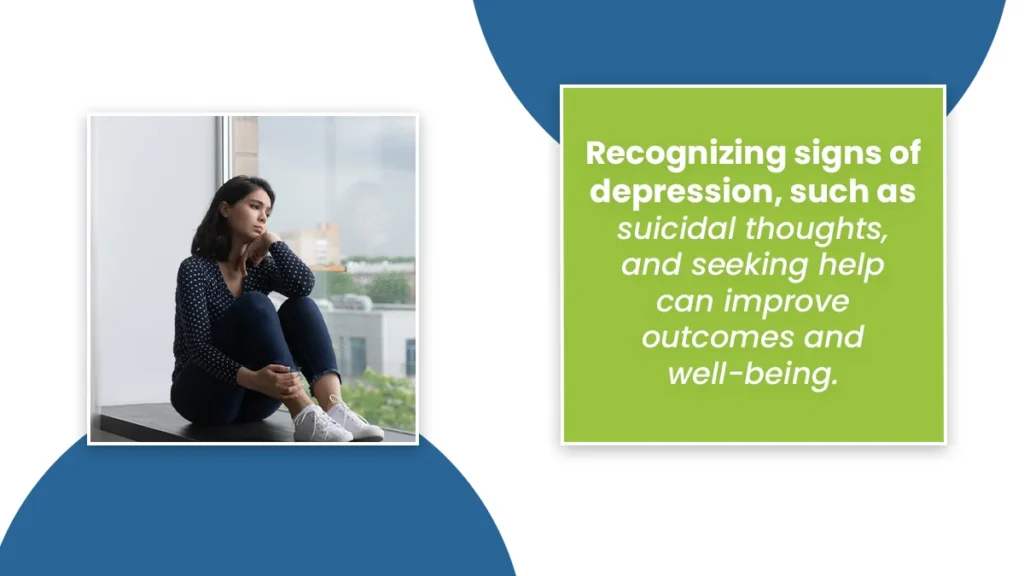Depression is a common mental health disorder that impacts the lives of people worldwide. It comes in various forms, with major depression and persistent depressive disorder being more intense. People experiencing depression feel persistent sadness and a lack of interest in daily activities.
Depression can range from mild to chronic and may be triggered by genetic, biological, or psychological factors. It’s vital to recognize these mental disorders and seek support and treatment to improve well-being. Understanding depression helps foster empathy and promotes a more compassionate approach to reducing the effects of depression.
Key Takeaways
Depression affects mood and daily life, requiring understanding, support, and treatment. Here’s what you need to know:
- Depression results from a mix of various factors, including genetics and brain chemistry.
- Recognizing signs of depression, such as suicidal thoughts, and seeking help can improve outcomes and well-being.
- Effective treatment for depression involves therapy programs along with lifestyle adjustments.
The Haven Detox-New England offers a mental health treatment program for long-term recovery. Contact us today at (844) 933-4145 for more information.

Depression and Brain Chemistry
Depression, a common mental health condition, is closely linked to alterations in brain chemistry. In individuals experiencing depression, there are notable changes in neurotransmitter chemicals. These chemicals transfer signals between brain cells and play a significant role. The primary neurotransmitters associated with depression include serotonin and dopamine.
Low levels of serotonin, often referred to as the “feel-good” neurotransmitter, are commonly associated with depressive symptoms. Moreover, decreased dopamine levels lead to a lack of interest and motivation. This disruption in brain hormones contributes to constant feelings of gloom and a consistently low mood.
The Role of Genetics and the Environment
The exact cause of depression is complex, involving a mix of genetic and environmental risk factors. Some individuals with genetic predisposition are at higher risk of developing this serious mental illness. Environmental factors, such as complex life events or chronic stress, can trigger or worsen mental health conditions. Understanding the interplay between genetics and environment provides insight into why some people may have a more challenging time coping with depressive symptoms.
Recognizing that depression is not solely linked to a single cause but rather a combination of biological and environmental influences underscores the need for a holistic approach to treatment.
Diverse Variations and Characteristics
Depression comes in various types, each with its own set of characteristics and symptoms. Understanding its different types is crucial for accurate diagnosis and effective treatment.
Major Depressive Disorder (MDD)
Major depressive disorder is a common and severe mood disorder marked by sensations of sadness, despair, and loss of interest or pleasure in activities. People with major depressive disorder may experience depressive episodes that last for weeks or months, affecting their everyday life.
Persistent Depressive Disorder
Persistent depressive disorder, also referred to as dysthymia, is a chronic form of depression where individuals experience a continuous low mood for at least two years. While the symptoms may not be as severe as major depressive disorder, they can still significantly impact daily life.
Bipolar Disorder
Bipolar disorder involves cycling between periods of depression and mania, a state of heightened mood and energy levels. Individuals with bipolar disorder experience depressive episodes similar to those with major depressive disorder, but they also have periods of intense euphoria and heightened activity.
Seasonal Affective Disorder (SAD)
Seasonal affective disorder (SAD) is a type of depression that happens seasonally, typically during the winter months when there is less natural light. SAD is thought to be related to changes in daylight patterns, which can disrupt the body’s internal clock and lead to depressive symptoms.
Signs You Need to Look Out For
Depression manifests through a variety of symptoms that impact a person’s emotional and physical health. Individuals experiencing a major depressive episode may encounter:
- Persistent feelings of emptiness
- Loss of interest in activities once enjoyed
- Changes in appetite or weight, such as weight gain or loss
- Difficulty sleeping or oversleeping
- Fatigue or loss of energy
- Feelings of worthlessness or excessive guilt
- Difficulty concentrating or making decisions
Physical symptoms, like headaches or digestive issues, can also accompany depression. Additionally, episodes of depression might lead to thoughts of self-harm or suicide. Recognizing these signs is crucial for seeking appropriate depression treatment and support. People experiencing depression may also turn to alcohol or substances, increasing the risk of cardiovascular disease or worsening a chronic health condition.
Effect of Depression on Social and Personal
Symptoms of depression can profoundly affect a person’s social and personal life. Constant sadness and significant mood changes can make it difficult to perform well in everyday activities. Episodes of major depression may disrupt relationships and work life. The use of illicit drugs as a coping mechanism can further exacerbate the situation, leading to substance use disorder.
Psychological factors, including a family history of depression and individual predispositions, can contribute to physical effects such as changes in appetite and poor sleep quality. Daily activities and responsibilities may become overwhelming, impacting productivity and self-care. It can also contribute to a negative cycle where the individual avoids social interactions, worsening their emotional struggles.
Diagnostic Criteria of Depression
Depression can show up in different ways, like manic depression, where people have times of feeling very down and other times of feeling overly excited or energetic. When diagnosed, individuals might get treated with medications called antidepressants, or they will take part in therapy sessions or sometimes a mix of both.
Screening and Testing
Diagnosing depression involves various screening and testing methods, including a physical exam conducted by a healthcare provider. Individuals may undergo psychological assessments, such as questionnaires or interviews, to evaluate symptoms and their severity. These assessments help identify possible causes and determine the most appropriate treatment plan.
DSM-5 Criteria for Depression
The DSM-5 criteria for depression provide guidelines for healthcare providers to diagnose the condition. Depression symptoms, according to this criteria, include alterations in eating patterns or body weight, disruptions in sleep, fatigue, feelings of worthlessness or guilt, severe distress, challenges in focusing, and thoughts of self-harm or suicide may also be present. To be diagnosed with depression, individuals must exhibit a specific number and combination of these symptoms over a defined period.
Treatment and Management of Depression
The treatment and management of depression encompass a combination of psychotherapy, medication, and support groups. Primary care doctors and health professionals play an important role in helping you overcome depression.
Psychotherapy
Treatment and medical help for severe depression involve various approaches tailored to individual needs. Psychotherapy or talk therapy, including cognitive behavioral therapy (CBT), is a common and effective method.
In CBT, individuals attend sessions with a therapist to identify and change negative thought patterns, developing healthier ways to cope with challenges. This approach is particularly beneficial for young people dealing with depression, as it equips them with valuable skills to navigate major life changes.
Medication
Another avenue for managing depression is through antidepressant medications. There are different types of antidepressants, and finding the right treatment often involves collaboration with healthcare professionals. These prescription drugs can play a vital role in improving mood and overall mental well-being, especially after the diagnosis of major depressive disorder.
Support Groups
Support groups also contribute to the overall treatment plan. They offer their services online and onsite. Meetings are organized to help individuals share their thoughts with a welcoming community of people. Talking to people who have gone through similar things can help a lot when you’re dealing with depression.
Being part of support groups is like being in a community where everyone understands what you’re going through. It gives you a feeling of belonging and can encourage you. Support groups aren’t just about mental health. They also help with your overall well-being in mind and body.
Lifestyle Changes to Promote Better Mental Health
Managing depression means finding ways to feel better. Making changes in your everyday life can help a lot. Adopting health habits such as eating well, jogging, performing exercise regularly, and getting enough sleep can alleviate symptoms of mental disorders. These changes are essential for people with depression, which is a serious mood disorder.
Also, having a routine and setting small goals can help you feel more in control of your life. Doing things you enjoy and spending time with others can lift your spirits. It’s also a good idea to get in touch with someone you trust, like a close friend, or seek help from a mental health professional if you need it. You can start feeling better and more hopeful by trying these different strategies.
Frequently Asked Questions (FAQ)
What is depression and its main causes?
Depression is a serious mood disorder, and its causes include a combination of biological aspects, brain chemistry imbalances, hormonal changes, chronic stress, trauma, and environmental factors. Major life events, such as the loss of a loved one or significant life changes, can also trigger depression.
How do humans cope with depression?
People cope with clinical depression in various ways. Seeking social support from friends and family members is crucial. Some turn to medical treatments, like talking to a primary care doctor or taking prescribed medications.
Self-help strategies, such as engaging in activities they enjoy, creating routines, and practicing mindfulness, also play a role. Combining these approaches helps individuals effectively manage and alleviate the impact of clinical depression on their daily lives.
What are the mental and physical signs of depression?
Depression exhibits various mental and physical symptoms. Common mental symptoms include:
- Low moods.
- Loss of interest.
- Sudden weight loss or gain.
- Changes in sleep patterns.
Individuals may experience difficulty concentrating and low energy levels.
Physical symptoms can include changes in appetite, unexplained aches, and fatigue. In some cases, depression may coexist with an anxiety disorder, intensifying feelings of worry and nervousness.
Find Hope at The Haven Detox-New England
Depression can hinder the normal functioning of life and can impact your performance at work or school. If you or someone you know is dealing with it, contact The Haven Detox-New England.
We offer mental health treatment programs that include counseling, therapy programs, and support to help you overcome depression. Our residential treatment programs provide 24/7 medical supervision and treatment for deep-rooted mental health challenges.
We stand with you during these tough times. Call us today at (844) 933-4145 for more information.
Verify Insurance
Let’s get you or a loved one help with a few simple steps.




